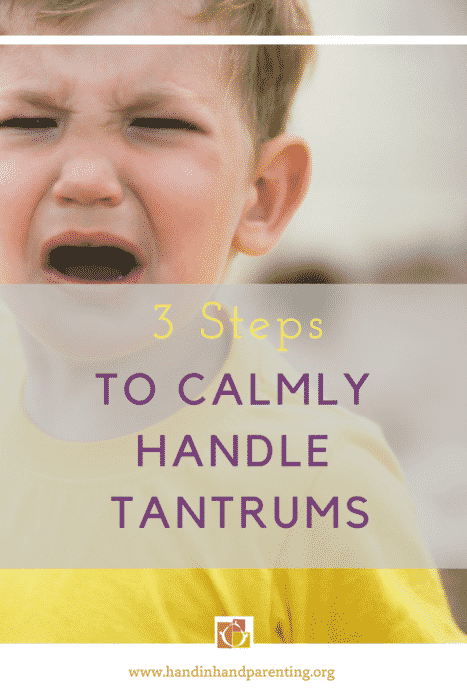![]()
If you are a parent, you know tantrums come with the territory. And if you know Hand in Hand Parenting, you know that there are one or two simple tools that can help you navigate tantrums calmly. Setting Warm Limits on a behavior is one tool, and another is Staylistening – listening while your child offloads all the feelings he or she has about something. There's more about the science of tool of staylistening here.
How is it Possible To Handle Tantrums Calmly?

Yet, no matter how much we understand and recognize that these tantrums are a necessary, usual and, in fact, helpful part of childhood, keeping calm when they happen can be HARD. How is it possible to handle tantrums with calm?
There are a few things you can do to make life a little easier for yourself.
Find Someone to Listen to Your Tantrums!
Yes, you read that right! Step one is getting plenty of listening time. A partner who can uphold that both you and your child are good people (just having some challenges) gives you space to find creative solutions and get calm about what might happen. You might mention all the things that upset you about your child tantrumming. The embarrassment or judgments you feel. The unfairness of having to listen to your child when no-one listened to you. Part of the beauty of this kind of listening tool is its reciprocal nature. Yes, you spend time and energy listening to your little one, and then you get someone to listen to you. We often overlook this vital element of parenting self-care, even when we feel how valuable it is. If you are new to the concept of listening time, do look up this post on How Listening Partnerships Work and Where to Find Them.
Set Your Limits Early
Another thing you can do is to move in early and set a limit. When we do this at the first sign of off-track behavior, we are likely less embroiled. We don't feel our buttons have been constantly pushed and we don't feel our boundaries have been unfairly crossed. This leaves us in a calmer state. From here, and is the time we can try and employ play or laughter to relieve the feelings that can later lead to a meltdown.
Get Prepped For Regular Tantrum Triggers
This third point sounds so simple: Be prepared. For many of us, we ignore warning signs hoping that tantrums won't happen. Instead, take time to notice what really triggers a tantrum for your child. Some kids find new situations – parties, family gatherings, classes – difficult and will cry and scream about going each time they have to. Some kids love what they are doing so much, they aren't ready to stop. Noticing these triggers can help us prepare.
If you know that your child NEVER wants to get out of the pool without a fight, you can decide ahead of time if you have the capacity to handle it, what limits you want to set or if it's better to skip swimming this time if you don't. (Or will that just bring on another tantrum?) If a trip to the pool is looming and the history of tantrums there gets you triggered, try bringing the whole kid and caboodle to your listening partner. Letting off some of the steam can help you find some calm too.
Here's how Hand in Hand Instructor Yasmeen Almahdy set limiits with her daughter on playtime and then listened calmly – for 40 minutes! Yay Yasmeen!
How I Set Limits on Play
 “My daughters and I were in a food court with a play area. My youngest daughter, who is 6 years old, asked to play for a while in the play zone and I had no problem with that. I had a plenty of time to stay. I did let her know that her sister was in another mall close by, and that also has a play area she likes. I gave her the option of going to the other mall ahead of picking up her sister and playing there, but she chose to stay where we were and I gave her an hour to play.
“My daughters and I were in a food court with a play area. My youngest daughter, who is 6 years old, asked to play for a while in the play zone and I had no problem with that. I had a plenty of time to stay. I did let her know that her sister was in another mall close by, and that also has a play area she likes. I gave her the option of going to the other mall ahead of picking up her sister and playing there, but she chose to stay where we were and I gave her an hour to play.
When I told her it was time to pick her sister up from the mall, she came right away. We drove over and stayed in the car while I called her sister.
Just then my youngest asked to play in this mall's play area. “Just for a couple of minutes,” she said.
I'd kind of known it was coming. My daughter does love to play in this mall. Also, she doesn't like to miss any opportunity to play.
Because I had this gut feeling telling me that she would ask, I felt prepared.
I told her very calmly, “Sweetheart, I know that you want to play but today we can't.”
It took just a few seconds until she was in tears screaming.
Her sister came and I drove back home.
She kept screaming.
Keeping Calm Through a 40-Minute Tantrum
“Turn back to the mall now,” she demanded.
Calmly, I told her, “I know you really want to do that but we can't honey.”
In the middle of our way, the traffic got really bad. While we waited to move I looked at her warmly, and gently touched her hair.
I kept listening to her crying for almost 40 minutes. All the way back home I gave my all, listening with great warmth and patience. This felt heart-breaking and nervous breaking at the same time!
When we got back home, she stopped crying and said, “Mummy, next time I will go to the kid's area in the mall and I'll play a lot.”
That was it!
I agreed of course
She already looked much more comfortable, almost shinier after her big cry and even put herself happily to bed that night.
(I, however, needed a listening partnership right away. After all that listening to her, it was time for me to off-load!)”
Tantrums are not something we can avoid. If we placate a child's wants, those wants to grow and grow until they show up in a tantrum. If we try and force an issue – like getting out the door – the sudden transition can bring on a tantrum. If we send a child into a timeout for behavior that is an indication that they want us close, we find ourselves dealing with a tantrum – and sending a child away that really needs some connecting close time with the person they love best.
None of these ways of dealing with tantrums stops them, and in the process, we often get angry or sad too.
When you employ these tools as a 3-step process, you won't stop tantrums happening but you will find yourself less triggered, more prepared, and able to handle tantrums more calmly.
